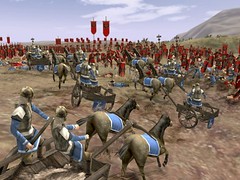Thursday, April 07, 2005
Games that help people learn have long been a largely unrealized dream for enlightened designers and a spend-thrift, edutainment threat for corporate curmudgeons. Lately, I've been getting vibes that the enlightened crowd is winning.
 Last month, Mark Oelert was raving about the Serious Games Summit and how the training industry looks moribund by comparison. Of course, Mark is such a fanatic that he totes around a laptop that weighs as much as a sack of bricks so he has sufficient horsepower to play whatever comes within reach. Mark gave me a copy of Raph Koster's A Theory of Fun, which I've found quite refreshing.
Last month, Mark Oelert was raving about the Serious Games Summit and how the training industry looks moribund by comparison. Of course, Mark is such a fanatic that he totes around a laptop that weighs as much as a sack of bricks so he has sufficient horsepower to play whatever comes within reach. Mark gave me a copy of Raph Koster's A Theory of Fun, which I've found quite refreshing.
 Next month, my pal Clark Quinn's book, Engaging Learning: Designing e-Learning Simulation Games, will hit the stores.
Next month, my pal Clark Quinn's book, Engaging Learning: Designing e-Learning Simulation Games, will hit the stores.
 Climbing Albany Hill yesterday, my alternative to cardiac rehab, I listened to an mp3 interview with an MIT professor lamenting the ignorance of gaming in the popular press (games generate as much revenue as movies). He said kids' number one complaint about homework was that it was too hard; their number one complaint about games is that they're too easy.
Climbing Albany Hill yesterday, my alternative to cardiac rehab, I listened to an mp3 interview with an MIT professor lamenting the ignorance of gaming in the popular press (games generate as much revenue as movies). He said kids' number one complaint about homework was that it was too hard; their number one complaint about games is that they're too easy.
And then I just came upon this paper by James Gee entitled Learning by Design: good video games as learning machines.
Read Gee's article: it provides examples of these and other principles in games and in education. Compared to a doctrinaire treatise on instructional design or the minutiae of task analysis, this is a breath of fresh air.
 Last month, Mark Oelert was raving about the Serious Games Summit and how the training industry looks moribund by comparison. Of course, Mark is such a fanatic that he totes around a laptop that weighs as much as a sack of bricks so he has sufficient horsepower to play whatever comes within reach. Mark gave me a copy of Raph Koster's A Theory of Fun, which I've found quite refreshing.
Last month, Mark Oelert was raving about the Serious Games Summit and how the training industry looks moribund by comparison. Of course, Mark is such a fanatic that he totes around a laptop that weighs as much as a sack of bricks so he has sufficient horsepower to play whatever comes within reach. Mark gave me a copy of Raph Koster's A Theory of Fun, which I've found quite refreshing."Fun, as I define it, is the feedback the brain gives us when we are absorbing patterns for learning purposes."
 Next month, my pal Clark Quinn's book, Engaging Learning: Designing e-Learning Simulation Games, will hit the stores.
Next month, my pal Clark Quinn's book, Engaging Learning: Designing e-Learning Simulation Games, will hit the stores. "Learning is at its best when it is goal-oriented, contextual, interesting, challenging, and interactive. These same winning characteristics also define the best computer games, which suggests that the most effective learning experiences are also engaging. Learning can and should be hard fun!"
 Climbing Albany Hill yesterday, my alternative to cardiac rehab, I listened to an mp3 interview with an MIT professor lamenting the ignorance of gaming in the popular press (games generate as much revenue as movies). He said kids' number one complaint about homework was that it was too hard; their number one complaint about games is that they're too easy.
Climbing Albany Hill yesterday, my alternative to cardiac rehab, I listened to an mp3 interview with an MIT professor lamenting the ignorance of gaming in the popular press (games generate as much revenue as movies). He said kids' number one complaint about homework was that it was too hard; their number one complaint about games is that they're too easy.And then I just came upon this paper by James Gee entitled Learning by Design: good video games as learning machines.
"Good game designers are practical theoreticians of learning, since what makes games deep is that players are exercising their learning muscles, though often without knowing it and without having to pay overt attention to the matter. Under the right conditions, learning, like sex, is biologically motivating and pleasurable for humans (and other primates). It is a hook that game designers own to a greater degree – thanks to the interactivity of games – than do movies and books."As if to echo Clark Quinn's words above, Gee concludes that "When we think of games, we think of fun. When we think of learning we think of work. Games show us this is wrong. They trigger deep learning that is itself part and parcel of the fun. It is what makes good games deep."
"There are many good principles of learning built into good computer and video games. These are all principles that could and should be applied to school learning tomorrow, though this is unlikely given the current trend for skill-and-drill, scripted instruction, and standardized multiple-choice testing. The principles are particularly important for so-called ‘at risk’ learners, students who have come to school underprepared, who have fallen behind, or who have little support for school-based literacy and language skills outside of school.[Some of] The Principles
Codesign. Good learning requires that learners feel like active agents (producers) not just passive recipients (consumers).
Customize. Different styles of learning work better for different people. People cannot be agents of their own learning if they cannot make decisions about how their learning will work. At the same time, they should be able (and encouraged) to try new styles.
Identity. Deep learning requires an extended commitment and such a commitment is powerfully
recruited when people take on a new identity they value and in which they become heavily invested – whether this be a child ‘being a scientist doing science’ in a classroom or an adult taking on a new role at work.
Pleasantly Frustrating. Learning works best when new challenges are pleasantly frustrating in the sense of being felt by learners to be at the outer edge of, but within, their ‘regime of competence’.
Information ‘On Demand’ and ‘Just in Time.’
Human beings are quite poor at using verbal information (i.e. words) when given lots of it out of context and before they can see how it applies in actual situations. They use verbal information best when it is given ‘just in time’ (when they can put it to use) and ‘on demand’ (when they feel they need it).
Skills as Strategies. There is a paradox involving skills: People don’t like practicing skills out of context over and over again, since they find such skill practice meaningless, but, without lots of skill practice,
they cannot really get any good at what they are trying to learn. People learn and practice skills best when they see a set of related skills as a strategy to accomplish goals they want to accomplish.
System Thinking. People learn skills, strategies, and ideas best when they see how they fit into an overall
larger system to which they give meaning. In fact, any experience is enhanced when we understand
how it fits into a larger meaningful whole. Players can not view games as ‘eye candy’, but must learn to see each game (actually each genre of game) as a distinctive semiotic system affording and discouraging certain sorts of actions and interactions.
Meaning as Action Image. Humans do not usually think through general definitions and logical principles. Rather, they think through experiences they have had and imaginative reconstructions of experience. You don’t think and reason about weddings on the basis of generalities, but in terms of the weddings you have been to and heard about and imaginative reconstructions of them. It’s your experiences that give weddings and the word ‘wedding’ meaning(s). Furthermore, for humans, words and concepts have their deepest meanings when they are clearly tied to perception and action in the world.
Read Gee's article: it provides examples of these and other principles in games and in education. Compared to a doctrinaire treatise on instructional design or the minutiae of task analysis, this is a breath of fresh air.













0 Comments:
Post a Comment
<< Home